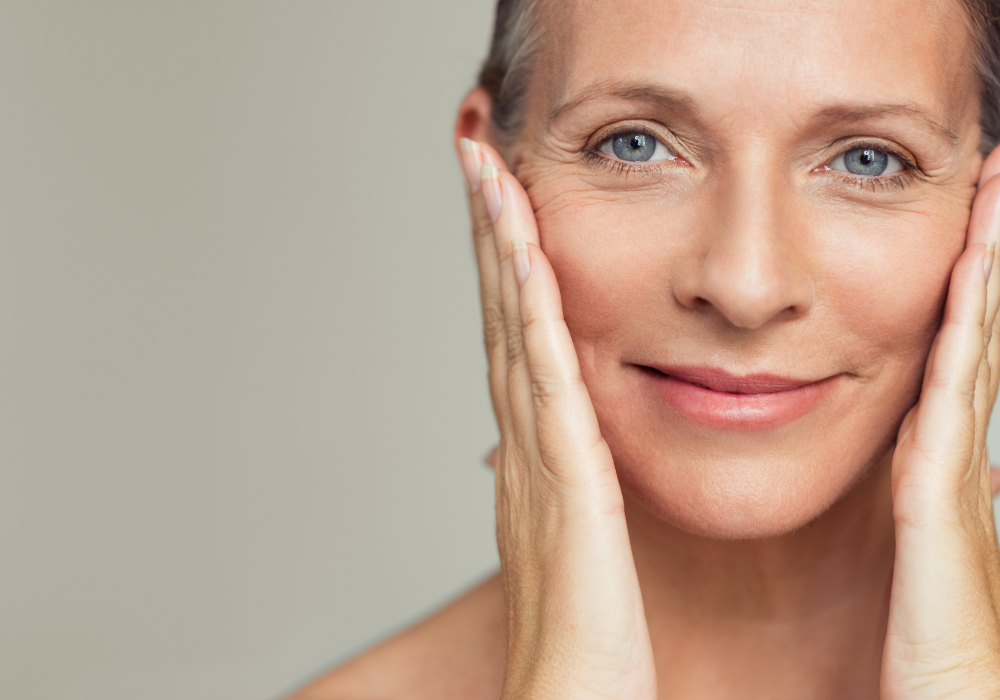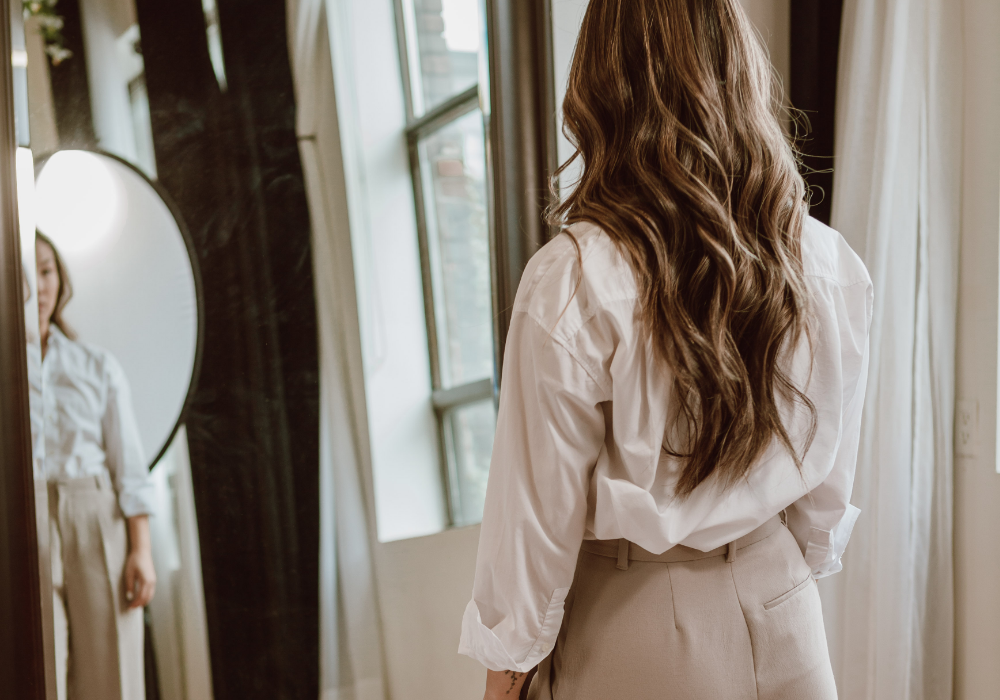Aging isn’t the problem—constant comparison is.

It’s not you—it’s the feed. Somewhere along the line, aging became a problem to fix instead of a process to respect. But here’s the catch: that panic you’re feeling about crow’s feet, smile lines, or not looking “refreshed” enough? It’s being fed to you—filtered, cropped, and curated for maximum self-doubt. We’re being taught to fear what’s completely normal because fear clicks. And clicks sell things.
You’re not aging wrong. You’re just not aging for Instagram. And the algorithm doesn’t reward reality. It rewards illusion: 22-year-olds with filler, influencers using face filters while selling you skincare, and ads that tell you to “fix” what’s not broken. But step back, unplug, and talk to literally any real person? You’ll find that your laugh lines aren’t a crisis. They’re a receipt for a life actually lived.
1. You’re noticing wrinkles—but that just means you’re showing up.

Wrinkles aren’t the enemy. They’re proof you’ve felt things. Laughed. Cried. Worried. Loved. But the internet has decided any visible sign of life must be lasered, frozen, or filtered out. When you scroll through social media and only see skin that looks laminated, it’s easy to feel like your face is “wrong.” It’s not.
You’re just seeing an edited version of humanity, not the real thing. According to Dave Gordon for the BBC, social media apps like FaceTune allow users to make subtle changes to their facial appearance, such as smoothing over wrinkles or completely transforming how they look, which can contribute to unrealistic beauty standards.
Those crow’s feet? They’re not a flaw. They’re a record of expression. A sign you’ve moved through the world and reacted like a human. The algorithm has trained us to believe aging should be invisible—but that’s because visibility doesn’t sell serums. If your skin reflects your life, that’s not a failure. That’s a flex. Don’t let pixels redefine what real looks like. You’re not aging too fast—you’re just not being airbrushed.
2. You feel tired more often, but that’s not a flaw—it’s biology.

You’re not broken because you need rest. You’re human. Your energy shifts as you age, and no, it’s not just you. The algorithm just forgot to mention that real people slow down. Online, you’ll see 50-year-olds running marathons, running companies, and somehow waking up at 5 a.m. glowing.
What you won’t see is their recovery days, their naps, or the fact that they have a personal trainer, dietitian, and maybe a private IV drip. Per researchers for the National Institute on Aging, older adults may experience changes in sleep patterns, including waking up more often during the night and earlier in the morning, but they still need the same amount of sleep as younger adults—about 7 to 9 hours per night—to maintain optimal health.
Needing rest doesn’t mean you’re falling apart—it means your body is wise enough to ask for what it needs. That’s not weakness. That’s regulation. You’re not lazy, out of shape, or failing at adulthood. You’re adjusting. And the pressure to feel 22 forever is a setup. Tired is not a moral failure—it’s just a body doing what it was designed to do after decades of showing up.
3. You can’t multitask like you used to and that’s actually a win.

Remember when you could juggle ten things at once and still function? Now your brain says “pick one thing and do it well—or we riot.” That’s not you losing it. That’s you evolving. Multitasking is mostly chaos disguised as productivity, and your aging brain knows better. As highlighted by writers for Harvard Health, older adults especially struggle with multitasking because aging brains have more trouble blocking distractions, which can impair working memory and increase the chance of making serious mistakes.
Online life worships hustle. But burnout disguised as ambition isn’t sustainable. If your mind is asking for less noise, it’s because it’s finally learned what matters. You don’t need to do a hundred things at once to prove you’re still capable. You need to do fewer things more intentionally—and that’s not falling off. That’s leveling up. Your attention is valuable. Don’t waste it trying to match a pace designed to break you.
4. Your body is changing shape, but it’s not betraying you.

The internet will try to convince you that your body shifting—thicker waist, softer arms, less “snap-back”—is something to panic about. But bodies aren’t meant to stay frozen in time. They evolve with you. That softness you see in the mirror? It’s not failure. It’s adaptation. And no amount of curated gym selfies or shapewear ads should convince you otherwise.
The pressure to “bounce back” is a lie—and it’s one the algorithm feeds daily. It’s why you think your old jeans define your worth and your metabolism is a personal insult. But your body is working with the information it has. Stress, hormones, sleep, decades of being alive. That’s not a flaw. That’s a miracle. You’re not losing your body—you’re living in a different one. One that deserves respect, not comparison.
5. You care less about being liked—and that’s power, not loss.

There was a time when approval felt like oxygen. Every outfit, opinion, or post was filtered through the question, “Will they like me?” But now? You’ve probably noticed that your tolerance for people-pleasing is dropping fast—and that’s not jadedness. That’s clarity. You’re not bitter. You’re just done bending yourself into a version of likable that fits someone else’s feed.
The internet trains us to curate, not connect. But aging tends to burn off the fluff. You know what you value, who you trust, and where you’re no longer willing to shrink. That’s not a crisis of relevance. It’s a re-centering. You’re allowed to say no. You’re allowed to show up unpolished. You’re allowed to like yourself more than strangers do. This isn’t you fading—it’s you finally surfacing.
6. You don’t keep up with trends and that’s intentional, not out-of-touch.

Fast fashion, fast content, fast opinions—everything’s designed to make you feel behind. But here’s the thing: stepping off the trend treadmill isn’t a failure. It’s a choice. Maybe you don’t know the latest TikTok sound or the name of the newest face serum. That’s not a sign you’re aging poorly. That’s a sign you’ve stopped letting algorithms tell you who to be.
You’ve probably realized that chasing every trend doesn’t make you feel relevant—it makes you feel exhausted. And that’s the trap. The system profits when you feel outdated, because that’s when you start buying and scrolling in a panic. But you don’t have to play. Aging well doesn’t mean keeping up. It means knowing what matters and ignoring what doesn’t. And if that makes you “out of touch,” maybe touch was overrated anyway.
7. You’re more emotional but that doesn’t make you weak.

There’s this myth that getting older means getting tougher. But for many people, aging means feeling more—not less. You cry more easily. You get choked up watching commercials. You start caring about things you used to breeze past. And guess what? That’s not emotional instability. That’s depth. That’s your nervous system dropping the armor because it finally can.
Social media trains us to be numb, ironic, and detached. But your growing tenderness is a rebellion against all of that. You’ve lived enough to know what hurts, what matters, and what doesn’t need a joke to be real. That sensitivity isn’t something to fix. It’s evidence that you’re still open, still moved, still growing. You’re not falling apart—you’re finally soft enough to hold the world honestly.
8. You’re drawn to comfort over aesthetics—and that’s called evolution.

There was a time when you’d suffer through tight shoes, itchy fabrics, or a chair that looked cool but felt like a punishment. Now? You want clothes that breathe, shoes that support, and furniture you can actually sit in without regretting it. That’s not “giving up”—that’s aging wisely. You’ve stopped dressing for the grid and started dressing for your sanity.
The algorithm makes comfort look like laziness. It sells the idea that youth = pain, and style means sacrifice. But you’ve already spent years chasing that—and now your body is asking for peace. Prioritizing ease isn’t failure.
It’s freedom. You’re not opting out. You’re leveling up. You can still look good. You just don’t have to suffer to do it. And once you stop performing discomfort for aesthetics, it’s wild how much better you feel.
9. You’re craving real connection instead of constant performance.

The older you get, the less energy you have for surface-level small talk or relationships built on likes and reaction emojis. You start seeking people who actually listen. People who care more about how you’re feeling than what you’re wearing. That shift isn’t you becoming “boring”—it’s you becoming real. You’ve outgrown the game of approval-by-algorithm.
Online culture rewards constant performance: perfect lighting, snappy captions, curated updates. But that kind of connection is shallow by design. And when your values shift toward depth, you naturally disconnect from the scroll. You want substance. Honesty. Conversations where no one is selling anything. That doesn’t mean you’ve lost your edge. It means you’ve lost your tolerance for fakery. And that’s a sign of growth—not decline.
10. You’re seeing beauty in things you used to overlook.

You catch yourself staring at the sky longer. Noticing how good your coffee smells. Watching the way your kid’s face scrunches when they laugh. These moments used to blur into the background while you chased goals, trends, and timestamps. But now? They hit different. That’s not slowing down. That’s tuning in.
Social media teaches us to look for wow-factor, virality, or drama. It tells us to find beauty in filters and spectacle. But aging shifts your focus. Suddenly, the small stuff feels huge. And the things that once seemed impressive feel empty. That’s not you getting sentimental. That’s your awareness sharpening. You’re not bored—you’re just finally present. And there’s nothing more youthful than being able to see wonder in the ordinary.
11. You don’t want to go back—and that means you’re doing it right.

There’s a weird cultural obsession with turning back time. Every product, post, and promise is about reversing, erasing, or pretending you’re still 25. But here’s the truth: if you have no desire to relive your younger years, that’s not regret—that’s wisdom. You’ve made peace with your past and no longer want to squeeze yourself back into a version of life that didn’t fit.
You’ve earned your perspective. You’ve survived your awkward phases, bad decisions, and sleepless nights wondering if you were enough. And now you know better. Not wanting to “go back” doesn’t mean you’ve peaked—it means you’ve evolved. The algorithm doesn’t understand that, because it runs on nostalgia and insecurity. But you don’t have to. Forward is your direction. And that’s not aging—it’s arrival.
12. You’re finally living for yourself, not for the performance.

This might be the biggest shift of all. You stop making choices based on how they’ll look to others. You start doing things because they feel right, not because they’ll get applause. You wear what you like, say what you mean, rest when you’re tired, and stop performing your life like it’s a commercial break. That’s not giving up. That’s coming home.
The algorithm hates this part. It can’t monetize self-trust. It wants you constantly doubting, comparing, scrolling, spending. But when you age into yourself—into clarity, autonomy, and actual joy—you become harder to manipulate.
And that’s a threat to a system built on your insecurity. So if you feel more grounded, less influenced, and wildly uninterested in performing for people who don’t matter? Congratulations. That’s not aging poorly. That’s finally living well.